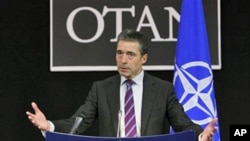The NATO alliance has agreed to send ships closer to the Libyan coast to monitor compliance with the U.N. arms embargo against the government of Moammar Gadhafi. But key alliance leaders, including U.S. Defense Secretary Robert Gates, say they do not have the authorization or regional support that would be needed for direct military action.
NATO Secretary-General Anders Fogh Rasmussen announced the decision to move the ships closer to Libya to improve what he called "situational awareness," and to help with humanitarian relief efforts. He says the alliance will also develop urgent and detailed plans for relief missions and for what he called "more active measures." He said that includes planning on how to create and enforce a No-Fly Zone over Libya.
But Rasmussen said there is no U.N. authorization for the use of force, and U.S. Defense Secretary Robert Gates agreed.
"The key factor here is first of all the limitations of the U.N. Security Council Resolution 1970, which even when it comes to the embargo does not provide the authority for enforcement,” Gates said. “So if there were to be a need for enforcement there would need to be a new U.N. Security Council resolution, even for that purpose."
Both Gates and Rasmussen said NATO will take further military action only if there is a clear need, a new U.N. Security Council resolution authorizing the use of force and support from North African and Middle Eastern countries. Gates said the alliance is "very mindful" of concerns in the region about the possibility of Western military activity in Libya.
"I think that a number of ministers made clear that we wanted to put ourselves in a position to assist the Arab League, the African Union or the U.N. in this endeavor, and very sensitive to NATO being responsive to those organizations, rather than taking an initiative on its own," he added.
Gates has said a No-Fly Zone would be a significant and potentially difficult military operation, and he has expressed concern about the regional reaction to any presence in Libya of Western ground troops.
Rasmussen stressed that no decision for additional military action was made during Thursday's meeting, but he said he can not imagine the international community standing "idly by" if Colonel Gadhafi continues attacking his own people. The NATO secretary-general also said if the current divide in Libya continues, it could become a "failed state" and "a breeding ground for extremism and terrorism."
He called the situation a matter of great concern and urged the Libyan government to stop the violence and "allow a peaceful transition to democracy."
Rasmussen said NATO is united, vigilant and ready to act, but for now is taking only limited action, while planning for possible stronger action in the future.




